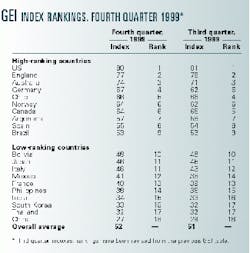Index rises only slightly during second tracking quarter
Based on growth in oil consumption, overall economic recovery, and increases in private power plant and distribution capacity additions, the average Global Energy Investment (GEI) index for the 20 countries tracked rose slightly, reaching a group average of 52 during fourth quarter 1999 compared with the third quarter.
The fourth quarter of 1999 was characterized by gains in oil use as some economies recovered their strength due to continued increases in private power generation and distribution assets in markets such as Argentina, Australia, Germany, Italy, the Philippines, and the US.
Third quarter of tracking
The GEI Index tracks over time, for a select group of countries, performance against financial and economic indicators and activity in the areas of energy market liberalization and privatization.
Changes indicate developments in the climate for energy investments.
Global energy industry investment rankings can reveal advances or reversals of conditions in both financial and energy activities in world energy markets. They can assist energy companies, investors, government officials, consultants, researchers, and sellers and buyers alike in market assessment and decision-making and in market-making activities.
This marks the third quarter that the GEI index was tracked.
Launched in October 1999, the index monitors trends in oil, natural gas, and power activities in a group of 20 selected countries that serve as a proxy for global energy activity (OGJ, Oct. 11, 1999, p. 21).
The index rose 5 points in prior quarter-to-quarter comparisons (OGJ, Jan. 10, 2000, p. 21). The one-point variance seen in the fourth quarter would seem to indicate a slowing trend in the upward shift of the index.
Top movers
The top 5 countries in the fourth quarter were US, England, Australia, Germany, and Chile (see table).
In addition, while oil consumption and production rose in the UK, strengthening its overall rating for the quarter, gas and oil production declined in the US. The result was a narrowing in the gap between the two countries' GEI scores.
This production downturn in the US offset the impact of a 4,855-Mw merchant power plant gain in the index. Canada fell 1 point in the index due to gas production declines.
Germany gained 5 points, based on a strong increase in oil use totaling 150,000 b/d and due to the completed sales of 10 Gw of generation capacity and private distribution gains.
Mexico's rating rose 3 points due to improvements in overall economic strength and higher oil use in its economy. A stronger economy and gains in private electric distribution edged Brazil up in the index. France rose 1 point based on oil use gains.
Economic gains and oil use increases pushed Spain up slightly higher in its GEI ranking.
Oil and gas production gains boosted Norway 2 points in the index. Italy rose 3 points, based on private power generation capacity gains and robust oil use growth of 175,000 b/d.
In Asia-Pacific markets, Australia upped its standing in the ratings 3 points based on power distribution privatizations and increasing oil use. The Philippines rose 4 points based on its stronger economy in the fourth quarter and gains in private generation capacity. South Korea rose 1 point based on a 70,000 b/d oil use increase, as did India, up 60,000 b/d.
China declined 2 points in the index as a result of sharply lower oil demand and a modest slowing in the economy in the fourth quarter. Japan rose 1 point, based on its higher oil use, while Thailand stayed flat vs. the third quarter.
In Latin America, both Chile and Bolivia stayed flat compared with their third quarter 1999 performance on the GEI, while Argentina slipped 1 point based on lower gas production trends-offsetting modest gains in power plant privatizations.

